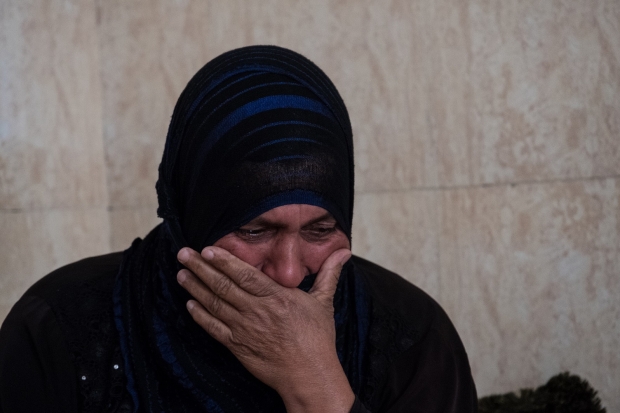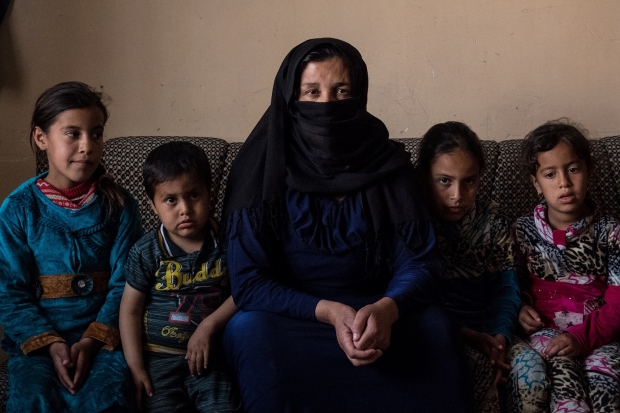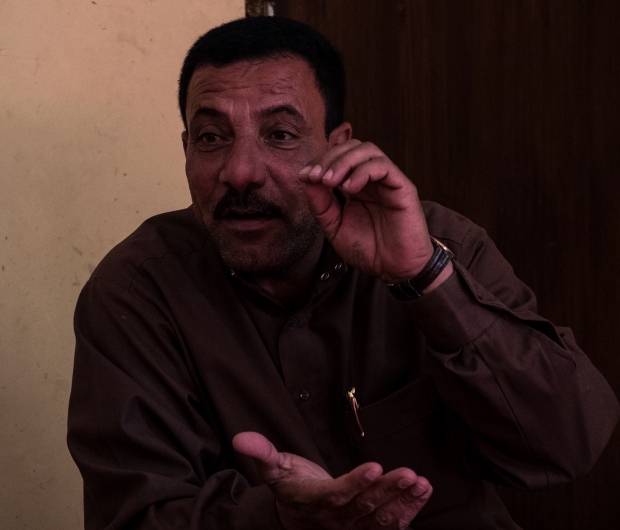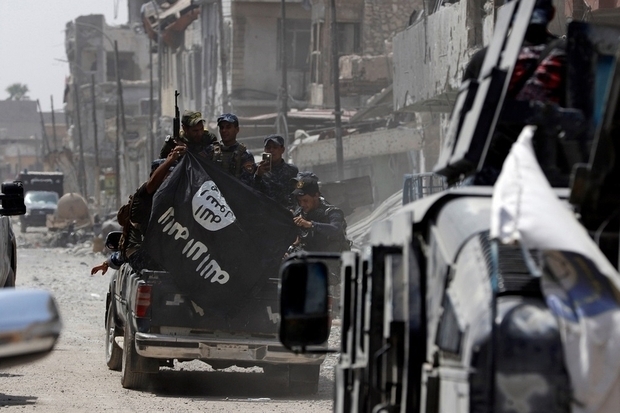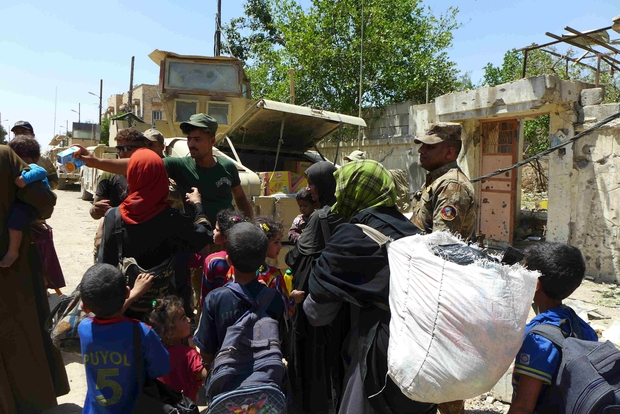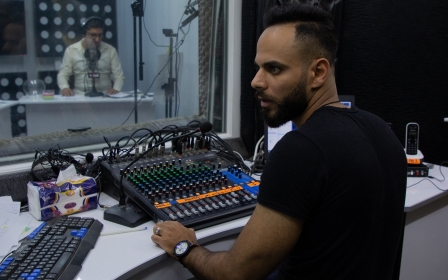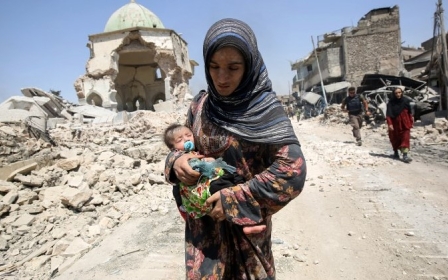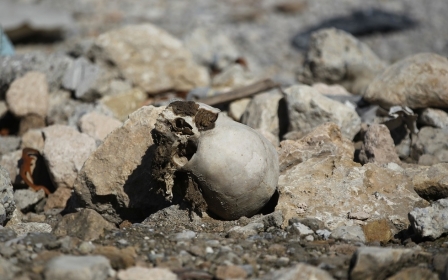Open arms and cIosed doors: IS members' families face hard return home
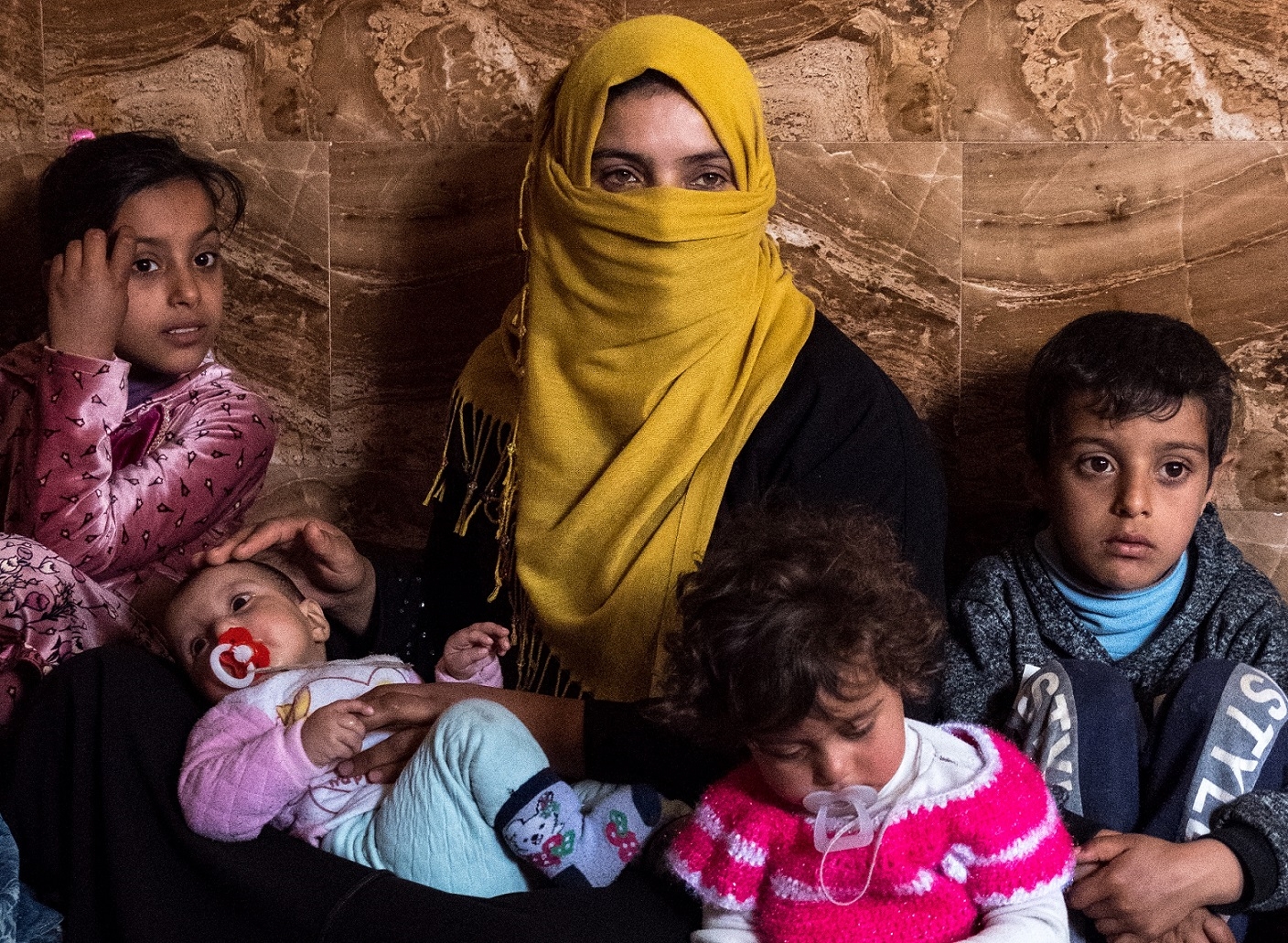
MOSUL, Iraq – Returning home was not a simple decision to take for Aisha, whose 17 year-old son was promised 72 virgins in heaven when he joined the Islamic State (IS), she said. By choosing to leave the IDP camp where she had found refuge with her husband and her youngest son, she bet against the odds.
“We were so scared of the reaction of the security forces and of the communities in Mosul after the battle," she confided, as she raised a yellow blanket on her legs and mustered the strength to sit up on the floor cushions of her living room, fighting the shooting back pains and sorrow that force her to lie down and remain inside on most days.
"We were afraid they would kill us all," she continued, with a glimpse of anxiety in her eyes.
After protracted deliberations with four community elders in traditional thobe tunics who sat beside him in his dimly lit living room, Khudair al-Jibouri, the mukhtar (local leader) in the impoverished Hayy al-Tanaq neighbourhood of western Mosul, estimates that more than 150 families associated with IS have resettled in the area in the past year.
The subject remains a delicate one in this community, where many of the IS-affiliated families who have returned are at risk of reprisals from outsiders.
We were so scared of the reaction of the security forces and of the communities in Mosul after the battle . . . We were afraid they would kill us all
- Aisha, mother of an IS member
Parents, wives, and children of IS militants, these families regarded as IS-affiliated by the security forces and vast segments of the population, are often collateral victims of their relatives’ decision to join the militant organisation.
When the latter seized the city in June 2014, its new recruits mercilessly imposed a reign of terror, under which summary executions, corporal punishments, and other forms of terror were daily occurrences.
With their relatives now missing, dead, or imprisoned, these families are today one of Iraq’s most destitute and marginalised populations. They face collective punishment and acts of retaliation in the country at large, ranging from forced displacement and sexual exploitation to the denial of basic humanitarian assistance and education, for crimes they did not commit.
"Like the other Daesh [IS] families in the camps, I was hesitant to come. We didn't know how our community would react," said Maha.
“But I was in a rush to return, I was afraid security forces would occupy our house because they knew it belonged to the wife of a member of Daesh," she added, referring to a practice recently documented in other parts of Iraq by leading human rights organisations.
As she opened the door to her near-empty living room, Maha instructed visitors in a notable exception to custom: "Keep your shoes on."
“Our house may still stand, but everything was looted after the battle. There is only bare concrete now, dirty shoes won’t make a difference," she continued with a sigh, as she sat with her five daughters and one of her sons on the only piece of furniture in her house, a sofa provided by her neighbours.
The beige and white walls of the living room are bare, save for a wedding picture hanging above her head, a memento of happier times, before her husband joined IS. “It’s the only photograph I have left of him," she said, looking up above her shoulder at the picture she has framed with a red floral garland.
Deep-running tribal links trump IS-affiliation stigma
While many of these families feared the worse upon their return to al-Tanaq, they were, much to their surprise, greeted with warmth and kindness by their community.
In stark contrast with other parts of the city and the country at large, where IS-affiliated families are stigmatised and targeted, a spontaneous and community-led reintegration initiative is taking place in this neighbourhood of the group’s former “capital” in Iraq.
By welcoming back more than a hundred IS-affiliated families over the past few months, their former neighbours hope to break a cycle of marginalisation that threatens to precipitate the repetition of past mistakes.
The deep-running tribal ties between al-Tanaq’s residents, who are predominantly from the Arab al-Jibouri tribe, one of Iraq’s largest, appear to have withstood the damage wreaked by the militant group on community links and the social fabric in other areas of the city and Iraq at large. Today, this tribal bond trumps the IS-affiliation of these families in the eyes of their neighbours.
Our neighbours are nicer to us than our own relatives who live in other areas . . . We only survive because the community feeds us
- Aisha, mother of an IS member
“Our neighbours have accepted us back into the community because we are all from the same tribes. We’ve known each other for all of our lives, long before Daesh came," Aisha explained.
“Our neighbours are nicer to us than our own relatives who live in other areas. Everything you see here, the pillows, the carpet, the food… all of it comes from our neighbours. They came to our aid when we had nothing left. We only survive because the community feeds us," she added, praising Allah for their kindness.
'Our real life line is the community'
For many of the poverty-stricken IS-affiliated families in al-Tanaq, the local community has stepped in where NGOs and the government have not.
“These families live on the help of the community, we bring them lunch and dinner every day. We help them before they have to beg for it," said Khudair, the head of the neighbourhood, taking pride in the fact that the community takes care of its own.
“Our real lifeline is the community," Maha confirmed.
“The community treats us very well, but I don’t have any income, and my husband is too old to work," she said, pointing at the elderly, chain-smoking man with a red keffiyeh sitting in silence beside her.
“Our grandchildren have to search through the rubble and the garbage to find items they can sell on the streets so they can eat," she lamented with a revolted expression.
For Khudair, helping these families was self-evident, but it does not mean all were welcomed back indiscriminately.
“We help these women and their babies because they are innocent, because they have nothing to do with their husband’s and father’s sins. The wives who fought alongside their husbands, those who killed, I sent them to the camps, they didn’t belong here," he said with a gesture of disdain.
The sons and husbands who fought with IS, he explained, met a different fate altogether. “The checkpoints would call me and give me their names; I would simply say ‘yes’, or ‘no’," he confided.
“We lived with these Daesh families for three years, we know which ones are innocent and which ones are guilty," he added, as if to justify the seemingly summary justice he carried over the phone.
Endemic poverty and political disenfranchisement
The future remains bleak, however, for these families and the neighbourhood of al-Tanaq at large.
Short of decisive government policy, the community’s ongoing reintegration efforts may be short-lived. While its residents ruled out that IS could ever thrive again in this area, they nonetheless warned that the endemic poverty and disenfranchisement that have long afflicted their neighbourhood could one day fuel the rise of similar groups.
People are so poor in this neighbourhood, if I had any money, I could recruit all of the men in this room, and have them kill anyone I wished
- Khudair al-Jibouri, local leader in Hayy al-Tanaq
“Of course, we are afraid that IS will come back. But above all, we are afraid that other groups will rise up. People are so poor in this neighbourhood, if I had any money, I could recruit all of the men in this room, and have them kill anyone I wished," warned Khudair, as he pointed to the handful of his neighbours who had gathered round to follow the discussion.
“I want the people here to have jobs, so we can be safe," he said resolutely, as he hammered his fist into his left hand.
For many IS-affiliated families in the neighbourhood, the financial remuneration IS offered its new recruits when it stormed the city in June 2014 played a decisive role in sealing their relatives’ decision to rally under the organisation’s infamous black and white flag.
For Aisha, religion only ever played a secondary role in driving her son and some of her neighbours into the arms of the organisation. Economic precariousness and political disenfranchisement, she argued, played a far greater role.
“Sure, some joined Daesh because of fake religious promises. But so many more joined their ranks simply because they were unemployed. The government abandoned this area of Mosul a long time ago," she added, lamenting that the results of May’s parliamentary elections would hardly bring any change.
“No one running in the elections was from here. We’re forgotten. We’re unrepresented," she concluded with a sigh of resignation.
Second class citizens entangled in a Kafkaesque bureaucracy
In order to offer younger generations new prospects and foster their integration into society, ensuring that children of IS members have access to education should be a priority.
In practice, however, their families are routinely denied the basic forms of civil documentation they need to enrol their children at school.
The whole city wants to take revenge on them for what their relatives did
- Husamadin Abbar, Mosul Governorate council member
Draped in a baggy black dress, Suha, whose husband was jailed in Baghdad for fighting alongside IS, is at a loss. Only her eyes pierced through her yellow niqab, revealing an intense and arresting gaze, as she recounted her fight with a Kafkaesque bureaucracy.
“They ask for my husband’s ID, and for him to be present to issue those of our children and enrol them at school. But how could he, when they keep him in prison?” she asked, as she rocked her new-born from side to side and gave him small sips of water from a metal bowl.
“Two of my daughters have no IDs, and the youngest only has a Daesh birth certificate. For the government, it’s like she doesn’t exist," she continued.
Meanwhile, fears are growing that other communities of residents in Mosul may react violently to the return of IS-affiliated families to the city.
“The government hasn’t officially acknowledged that Daesh families are back in Mosul," said Husamadin Abbar, a councilman for the governorate of Mosul, explaining that the return of these families has so far been conducted unofficially.
He warned ominously: “The whole city wants to take revenge on them for what their relatives did, and everyone on the council is worried their return will cause serious security problems. We fear a civil war will break out if the government lets too many of these families settle back in Mosul."
This story originally appeared in the French edition of MEE.
New MEE newsletter: Jerusalem Dispatch
Sign up to get the latest insights and analysis on Israel-Palestine, alongside Turkey Unpacked and other MEE newsletters
Middle East Eye delivers independent and unrivalled coverage and analysis of the Middle East, North Africa and beyond. To learn more about republishing this content and the associated fees, please fill out this form. More about MEE can be found here.


